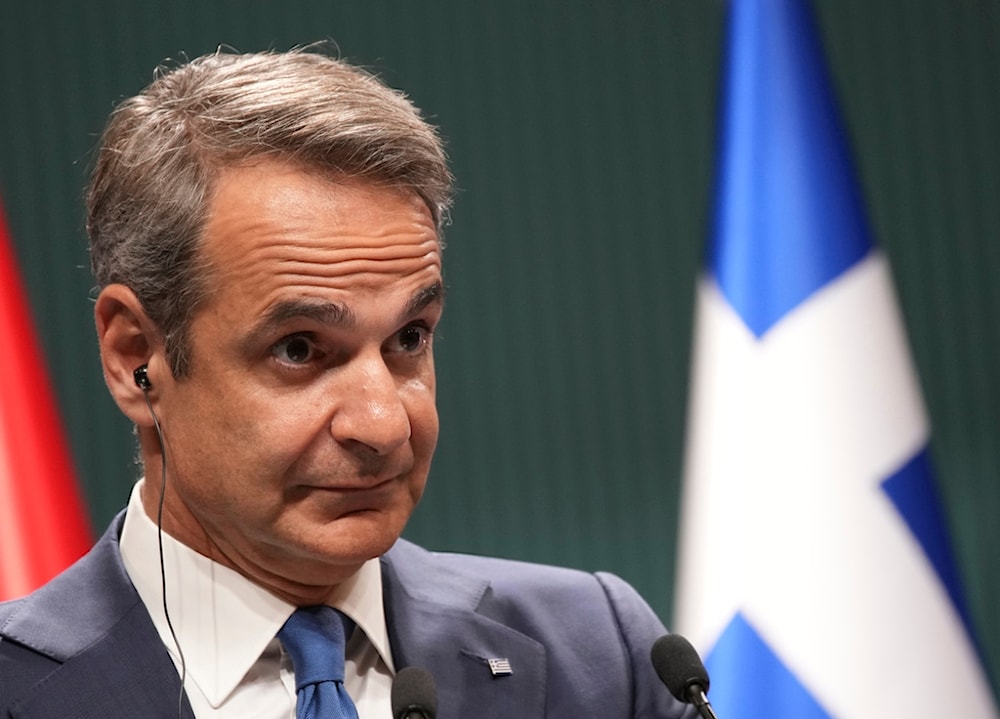Greek PM urges development of EU's own 'Iron Dome' air defense system
The Greek leader envisions it as an air defense system akin to "Israel's" Iron Dome.
-

Greek Prime Minister Kyriakos Mitsotakis listens to Turkish President Recep Tayyip Erdogan during a joint news conference in Ankara, Turkey, Monday, May 13, 2024. (AP)
Greek Prime Minister Kyriakos Mitsotakis has urged the EU to develop its own version of "Israel's" Iron Dome air defense system, alongside establishing a distinct financial mechanism to support collaborative European defense efforts.
"I am a supporter of a separate financial instrument to finance joint European defense activities. We can call it Eurobonds, we can call it something else. We will be much more convincing to doubtful Europeans if we link this European financial instrument with some significant projects of the common defense politics. I mean, in particular, the European air defense system, the European 'dome' that will protect Europe, all European countries from any threat," Mitsotakis said in an interview with Greek broadcaster Skai released on Thursday.
The Greek leader envisions it as an air defense system akin to "Israel's" Iron Dome.
"A European Iron Dome. I have already made this proposal, I am also working on it in more detail. You can imagine what this means for our country, to be able to use European capacities to cover our country's air defense, for us not to be completely dependent on the national budget," Mitsotakis said.
In February 2024, Greece joined the European Sky Shield Initiative, initially launched by Germany in August 2022 following the start of the war in Ukraine. This initiative unites several nations, including NATO allies such as the UK, Slovakia, Latvia, Hungary, Bulgaria, Belgium, the Czech Republic, Finland, Lithuania, the Netherlands, Romania, Slovenia, Estonia, and Norway. Sweden and Denmark joined the initiative in February 2023, followed by Switzerland and Austria in July of the same year.
Read more: NATO Chief condemns Russia's nuclear drills as reckless
This comes against the backdrop of heightened nuclear tensions, especially since France announced the possibility of deploying NATO troops to Ukraine if Kiev requests it.
On May 6, the Russian Ministry of Defense announced that the General Staff of the Russian armed forces had commenced preparations for exercises involving missile units of the Southern Military District, aviation, and naval forces.
According to the ministry, these exercises are focused on practicing various activities related to the preparation and deployment of non-strategic nuclear weapons.
Kremlin spokesman Dmitry Peskov associated these drills with recent remarks made by certain Western officials regarding the potential deployment of NATO troops to Ukraine.
Read more: US expands production of 15-ton bombs to target nuclear facilities
British Prime Minister Rishi Sunak recently issued a warning a meeting of the Policy Exchange think tank about the potential consequences of Russia's actions in Ukraine.
Sunak claimed that Russia's maneuvers in Ukraine could lead to a dangerous nuclear escalation and accused Moscow of weaponizing its energy resources to exert control over the West.
Russian Foreign Ministry spokeswoman Maria Zakharova dismissed Sunak's claims as "desperate lies" and refuted the accusations of nuclear escalation, pointing out that it was Ukraine, not Russia, who engaged in provocative actions near the Zaporozhye Nuclear Power Plant.
"Sunak’s lies are so desperate that one could even feel sorry for him," Zakharova said.
She further contested Sunak's assertions about gas supplies, noting that Russia had not halted its deliveries, contrary to the Prime Minister's claims.

 3 Min Read
3 Min Read








